
Revija za Kriminalistiko in Kriminologijo
Scope & Guideline
Advancing Knowledge in Criminalistics and Criminology
Introduction
Aims and Scopes
- Criminal Behavior Analysis:
The journal emphasizes the exploration of various forms of criminal behavior, including white-collar crime, intimate partner violence, and juvenile delinquency, examining their psychological, social, and economic underpinnings. - Criminal Justice System Evaluation:
It focuses on evaluating the effectiveness and efficiency of criminal justice systems, including police work, prison conditions, and legal processes, with the aim of identifying areas for improvement. - Victimology and Social Justice:
Research on the experiences and perspectives of victims, including issues of victimization in different contexts (e.g., domestic violence, sexual offenses), is a significant area of focus, reflecting a commitment to social justice. - Interdisciplinary Approaches to Crime:
The journal encourages interdisciplinary research that integrates insights from sociology, psychology, law, and forensic sciences to provide a comprehensive understanding of crime and its ramifications. - Policy and Legislative Implications:
It aims to inform policymakers and practitioners by publishing studies that highlight the implications of research findings on crime prevention, law enforcement practices, and legal reforms.
Trending and Emerging
- Impact of COVID-19 on Crime and Justice:
The pandemic has generated significant interest in its effects on crime rates, policing strategies, and justice system responses, leading to a surge in research addressing these timely issues. - Gender and Crime:
There is a growing focus on gender-related issues in criminology, particularly concerning intimate partner violence, female offenders, and the role of gender in criminal justice processes. - Green Criminology:
Emerging research in green criminology highlights environmental crimes and the intersection of crime with ecological concerns, reflecting an increasing awareness of sustainability and environmental justice. - Psychological Aspects of Crime:
An upward trend in studies examining the psychological characteristics of offenders and victims indicates a deeper exploration of the mental health dimensions of criminology. - Technological Advances in Crime Investigation:
Research on the use of technology in forensic investigations, including digital forensics and the implications of automation, is gaining traction, showcasing the importance of innovation in crime-solving.
Declining or Waning
- Traditional Crime Categories:
There has been a noticeable decline in research focused on traditional crime categories, such as burglary and theft, possibly due to a greater emphasis on emerging crimes and complex societal issues. - Local Case Studies:
Papers centered around localized case studies are less frequent, indicating a potential shift towards broader comparative analyses or thematic studies that transcend specific geographical contexts. - Historical Perspectives on Crime:
The exploration of historical contexts of crime and criminal justice seems to be waning, as contemporary issues take precedence in the current research landscape.
Similar Journals
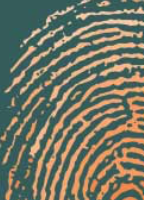
Annual Review of Criminology
Advancing the Frontiers of Criminology.The Annual Review of Criminology is a premier academic journal dedicated to advancing the field of criminology through comprehensive reviews of the latest research and emerging trends. Published by Annual Reviews, this journal is highly regarded within the legal realm, boasting a prestigious Q1 ranking in the Law category and an impressive Scopus rank of #13 out of 1025, indicating its significant influence with a 98th percentile standing. The journal focuses on synthesizing key developments from various branches of criminology, making it an essential resource for researchers, professionals, and students alike. Although it does not offer open access, readers can engage with high-quality, peer-reviewed articles that not only address contemporary issues but also provide foundational knowledge for future inquiries. With volumes converging from 2018 to 2021 and 2023 to 2024, the Annual Review of Criminology underscores its commitment to scholarly excellence and the dissemination of critical insights in the evolving landscape of criminal justice.
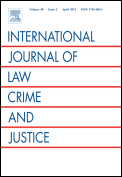
International Journal of Law Crime and Justice
Illuminating Contemporary Challenges in Law and CrimeThe International Journal of Law Crime and Justice, published by ELSEVIER SCI LTD, serves as a pivotal platform for the dissemination of cutting-edge research in the fields of law, crime, and justice. Established in 2008, the journal has established itself as a reputable source in its domain, holding a respectable Q2 ranking in Law, Political Science and International Relations, as well as Sociology and Political Science as of 2023. With an impact factor reflecting its influence, this journal ranks favorably within the top percentiles of Scopus in several social science categories, making it a critical resource for scholars and practitioners. The journal promotes open access, ensuring that vital research is accessible to a global audience. Scholars interested in the intricate intersection between legal studies, societal challenges, and crime will find the journal's objectives aligned with fostering knowledge and innovation in this dynamic field. Operating from its headquarters in London, England, the journal continues to invite substantial contributions that address contemporary issues and enhance our understanding of law and justice worldwide.

JOURNAL OF CRIMINAL LAW & CRIMINOLOGY
Advancing the Frontiers of Criminal Justice ScholarshipJournal of Criminal Law & Criminology, published by Northwestern University, is a premier scholarly journal dedicated to advancing the understanding of criminal law and criminological theories. Established in 1974, it has a strong history of publishing rigorous empirical research and critical analyses, contributing significantly to the discourse in legal and criminal justice studies. With an impressive impact factor and recognized as a Q1 journal in Law, it ranks favorably within the Scopus database, positioned in the top 25% of its category. This journal is essential for academics, legal practitioners, and students seeking insightful perspectives and developments in contemporary criminal justice issues. Although not open access, it provides a wealth of resources and discussions, making it an invaluable asset for anyone engaged in the study of law and criminology.

CRIME LAW AND SOCIAL CHANGE
Exploring the Nexus of Law and Social TransformationCRIME LAW AND SOCIAL CHANGE, published by SPRINGER, is a distinguished journal that caters to an interdisciplinary audience including researchers, professionals, and students in the fields of law, social sciences, and forensic medicine. With an ISSN of 0925-4994 and an E-ISSN of 1573-0751, this journal is a vital resource for those looking to explore the dynamic interplay between legal frameworks and societal change, particularly in relation to crime and its implications. As of 2023, it holds a commendable Q2 category ranking in Law and Social Sciences and a Q3 ranking in Pathology and Forensic Medicine, showcasing its impact within these vital domains. With its converged publication years from 1991 to 2024, CRIME LAW AND SOCIAL CHANGE is pivotal in advancing scholarly discourse and offering access to high-quality research that informs both policy and practice. Although not an open access journal, it provides valuable insights to its audience through rigorous peer-reviewed articles, making it an indispensable part of the academic literature in its respective fields.

Russian Journal of Criminology
Fostering critical analyses for a deeper understanding of crime.Russian Journal of Criminology (ISSN: 2500-4255, E-ISSN: 2500-1442) is an esteemed academic publication hosted by Baikal State University, dedicated to advancing the field of criminology. As a pivotal resource within the domains of law and social sciences, this journal offers a platform for scholars to disseminate innovative research, critical analyses, and comprehensive studies relevant to contemporary criminological issues. Although coverage has been discontinued in Scopus from 2020, the journal continues to provide valuable insights essential for professionals and researchers alike, with a focus on sociological and political perspectives on crime and justice systems. With its unique Russian context, the journal encourages a diverse array of submissions, facilitating a cross-cultural dialogue on criminology that contributes to global scholarship. Despite its current ranking of 478 out of 685 in law and 908 out of 1243 in sociology and political science, the Russian Journal of Criminology remains a vital resource for those seeking to explore the complexities of criminological phenomena and to further the academic discourse in this critical area of study.
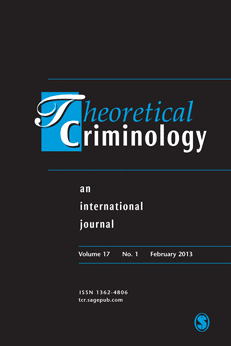
THEORETICAL CRIMINOLOGY
Innovating Theoretical Frameworks for Modern IssuesTHEORETICAL CRIMINOLOGY is a premier academic journal published by SAGE PUBLICATIONS LTD that serves as a vital platform for the dissemination of cutting-edge research in the realms of law, sociology, and forensic medicine. Established in 1997 and converging into a comprehensive resource through 2024, this journal has achieved a remarkable reputation with a 2023 Q1 ranking in Law as well as in Sociology and Political Science, underscoring its influential contributions to these disciplines. Situated in the United Kingdom, it is recognized for its rigorous peer-reviewed content and holds prestigious positions in Scopus rankings, including Rank #34 in Social Sciences - Law and Rank #38 in Medicine - Pathology and Forensic Medicine, reflecting its commitment to academic excellence. Although it does not currently offer open access options, the journal ensures that its articles are accessible through institutional subscriptions, making it an indispensable resource for researchers, professionals, and students aiming to deepen their understanding of theoretical frameworks and contemporary issues in criminology.
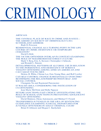
CRIMINOLOGY
Pioneering Research at the Intersection of Law and Medicine.CRIMINOLOGY, published by WILEY, stands as a leading journal in the fields of Law and Forensic Medicine, with an impressive impact factor that places it in the Q1 quartile for both categories. With its ISSN 0011-1384 and E-ISSN 1745-9125, this esteemed journal has been at the forefront of advancing knowledge and understanding in criminological theories and practices since its inception in 1963, and continues to be relevant through 2024. As of 2023, CRIMINOLOGY is ranked #19 in Social Sciences_ Law and #19 in Medicine_ Pathology and Forensic Medicine, positioning it within the top 2% of its field, making it an essential resource for researchers and professionals alike. Despite not offering open access, it provides invaluable insights into the complexities of crime, law enforcement, and societal impacts, thus shaping the future of criminological research and policy.
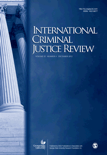
International Criminal Justice Review
Connecting theory and practice in criminal justice.International Criminal Justice Review is a premier journal in the field of law, published by SAGE Publications Inc, renowned for its commitment to advancing the understanding of criminal justice issues on a global scale. With an ISSN of 1057-5677, this journal spans a rich history from its inception in 1991 to its ongoing contributions into 2024, supporting a diverse array of research that addresses both theoretical and practical concerns in international criminal law. The journal holds a prestigious Q1 ranking in the Law category for 2023, reflecting its influence and relevance, as evidenced by its impressive Scopus rank of #68 out of 1025 in the Social Sciences Law field, placing it in the 93rd percentile. Though not an open-access journal, it provides vital access options for institutions and individuals alike. International Criminal Justice Review serves as a critical resource for researchers, practitioners, and students dedicated to exploring the complexities of international criminal justice systems, offering a platform for innovative scholarship that informs policy and practice worldwide.
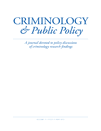
Criminology & Public Policy
Bridging Theory and Practice for a Safer SocietyCriminology & Public Policy, published by Wiley, is an esteemed journal that plays a pivotal role in the interdisciplinary fields of law, public administration, and literature. With a focus on innovation and empirical research, this journal addresses critical issues surrounding crime and justice while influencing policy decisions globally. The journal boasts a prestigious impact factor, reflecting its significant contribution to academic discourse, particularly noted for its top quartile rankings in the fields of Law, Literature and Literary Theory, and Public Administration in 2023. As a resource for researchers, practitioners, and policymakers, Criminology & Public Policy aims to bridge the gap between theory and practical application, presenting cutting-edge analyses and insights that are vital for addressing contemporary societal challenges. By providing a platform for rigorous scholarship, this journal supports the advancement of knowledge and fosters informed discussions that shape effective public policies.
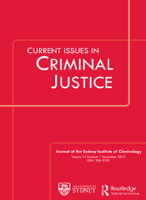
Current Issues in Criminal Justice
Advancing the Dialogue on JusticeCurrent Issues in Criminal Justice is a leading academic journal aimed at advancing research in the field of criminal justice, published by Routledge Journals, Taylor & Francis Ltd. With an impressive Q1 ranking in Law and a Scopus rank of #129 out of 1025, placing it in the 87th percentile of its field, this journal is recognized for its significant contribution to scholarly discussion and policy analysis. Covering topics from legal systems, crime prevention, and contemporary justice challenges, Current Issues in Criminal Justice serves as a vital resource for researchers, practitioners, and students seeking to explore pressing issues and innovative solutions within the justice system. The journal's commitment to high-quality, peer-reviewed research ensures that it remains at the forefront of legal scholarship, fostering interdisciplinary dialogue and informing policy development in the United Kingdom and beyond. With access options tailored for academics and practitioners alike, this journal is essential for those invested in the future of criminal justice research.